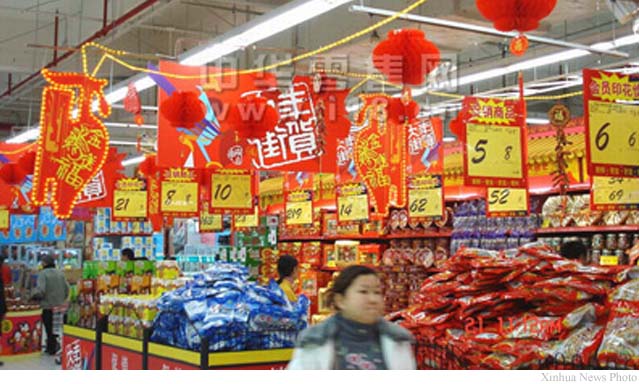Chinese New Year retail sales up 16 percent
Consumer spending up despite poor weather conditions

Feb 14 – China’s retail sales, the country’s key gauge of consumer spending, surged 16 percent during the weeklong Spring Festival holiday despite the worst winter storms in 50 year buffeting the country. Consumers spent RMB255 billion (US$34.9 billion) over the holiday, up from RMB219.8 billion in the same period last year, the Ministry of Commerce has reported.
The growth rate compares with 16.8 percent for all of 2007 and 15 percent during last year’s holiday. These “Golden Week” holidays – of which Chinese New Year is just one – were launched in 1999 to encourage people to spend more money for the benefit of economic growth.
The ministry attributed the surge to the country’s efforts to increase market supply and stabilize prices. The Chinese Government had stated prior to the holiday it would maintain a stable market and that commodities necessary to the lives of common people would not be out of stock or over-priced due to the heavy snow that blanketed much of the country. The government released part of its meat reserves to the market and redistributed 400,000 tons of vegetables between different regions.
It also exempted vehicles carrying fresh farm products from all road tolls and wholesale suppliers of such products from “as many charges as possible.”
Such moves were made following inflation in China rising at its fastest pace in a decade last year, with the consumer price index (CPI) increasing 4.8 percent.
Major retailers in the southwest city of Chongqing saw a year-on-year increase of 35 percent in sales during the Lunar New Year holiday, while those in the snow-hit eastern province of Anhui reported a 23.9 percent rise.
Sales soared 35 percent in Guangdong where 12 million migrant workers, 40 percent of the southern province’s total number, chose to stay because of blizzards in their hometowns. High-end household appliances, digital products, jewelry and thick overcoats became hot sellers in major cities.
China has tried various measures, such as pay rises and “golden week” holidays, to increase domestic consumption which it says is too weak. After scrapping the weeklong May Day holiday from this year, China still has two “golden week” holidays, including the Spring Festival (Chinese New Year) and the October 1 National Day.
Related Articles:
- Previous Article Common misperceptions about China
- Next Article Politicizing the Beijing Olympics a flawed concept









